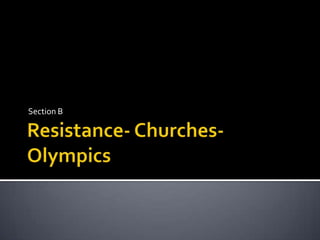
Nazi Germany Section B: Resistance and Opposition
- 1. Section B
- 2. YES NO Women were limited Factory workers got to career what was promised opportunities School boys enjoyed The treatment of HJ Jews/gypsies Business men- Churches- treatment restored order to of the disabled country Minor groups- Nazi Made lives more ideology secure
- 3. Little active resistance because the fear and efficiency of police state and indoctrination/propaganda. Many Germans were content with the regime Passive resistance was more commonplace, however still limited because of fear of the culture of denouncing.
- 4. Liked Jazz music and organised mixed parties. Dressed in US fashions Lived in port towns north east Germany Expressed dissent against Nazi’s ‘swing Heil’ Refused to attend Hitler youth Low level threat
- 5. Enjoyed singing, camps, walk s. Refused to attend Hitler youth 194, passed info to allies (treason) Moderate level of threat
- 6. University students of Munich Led by Hans and Sophie scholl Published/ distributed anti- Nazi literature Listened to foreign radio and passed info on the war Passed intelligence to the allies High level of threat, the Scholl’s executed 1943
- 7. Criticised Nazi Regime, treatment of Jews, Violation of human rights Ended Aktion t4 Very high level of threat due to his position in Germany
- 8. Refused to go along with Nazi conversion of churches Outspoken critic of Nazi regime Set up a protestant opposition movement Placed and died in concentration camp in 1943
- 9. Catholic and protestant churches had immense influence in German society Nazi’s were unable to use violent methods to control churches Even a nationalist state like Bavaria had sincere Christians. Attacking churches would lead to loss in support and a possible revolution.
- 10. Were taken more seriously than protestant churches because church ministers came from the Vatican city and protestants ministers were locals Hitler resented churches because he was unable to control its leaders and the fact the Germans had another leader alongside himself.
- 11. Franz von Papen made an agreement with the catholic church Hitler offered protection of religious freedom, no interference with property/ finances. Catholic schools assured but the Church mustn't interfere in politics
- 12. Less of a threat because: Leaders can be intimidated by Nazis' Protestants were sympathetic to Nationalism History of anti-Semitism Hitler created ‘national church’ with a Gaulitiers as first bishop of the National faith movement This was done in order to convince the German people there was common ground between Nazi ideology and Christian beliefs.
- 13. The criticism of the Nazi’s increased ministers refused to keep quiet because of the persecution of minority groups and restriction it placed on civil liberties 1935- closure of church schools, disbandment of catholic youth groups, closure of monasteries and secret imprisonment of priests Himmler and deputy Heydrich attempted to encourage paganism
- 14. Nazi’s failed to suppress Christianity and turn Germans away from it Protestants hoped Hitler would restore the status of protestant churches after the bill of rights They were afraid the Nazis would destroy churches Protestant agreed with persecution of Jews on religious grounds They were afraid of communism as all religions should be abolished
- 15. Propaganda opportunity for Nazi regime because Hitler wanted to promote German technology, Aryanism, German efficiency and to present Nazi power Hitler needed to hider anti-Semitic signs and allowed one Jew to be in the Olympics
- 16. NO YES Alarmed at German World impressed by militarism facilities and Britain built the spit fire efficiency People alarmed at the Infrastructure (auto fanatical following of Hitler bans ) Europe was worried Athleticism and about the dictatorship prowess Jesse Owens incident showed racism